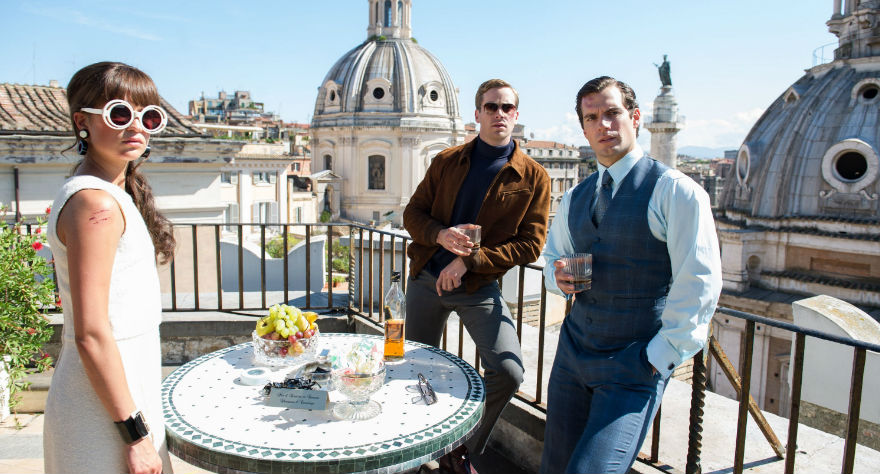
A jaunty retro spy thriller that's unapologetically obsessed with its own good looks.

A jaunty retro spy thriller that's unapologetically obsessed with its own good looks.
Guy Ritchie’s never had a problem with making his movies look good. His latest, retro spy-thriller reboot The Man From U.N.C.L.E., is arguably his slickest looking movie yet. He has trouble, though, when indulging in the pleasures of his eye-popping imagery just isn’t enough to sustain our interest. It’s a magic act: he’s showing us flashy, amazing things to distract us from the fact that his (recent) movies are, at their core, typical franchise cash grabs that don’t really mean or say anything interesting. But as long as he can keep us enthralled with his stylish visual tricks, who’s to say we can’t go home happy, buzzing with ignorant bliss?
As a late-summer action romp, The Man From U.N.C.L.E. is easy-peasy viewing. It’s fast, it’s fun, and it’s brimming with attitude. The television show on which it’s based ran from 1964-68 and starred Robert Vaughn as American secret operative Napoleon Solo, and David McCallum as Illya Kuryakin, his Soviet counterpart. It piggybacked on the burgeoning popularity of James Bond at the time, and while Ritchie’s movie does the same, it simultaneously—and more enthusiastically—capitalizes on the current trendiness of mod ’60s attitude and fashion brought on largely by the sucess of Mad Men.
Taking Vaughn’s place as Solo is Superman himself, Henry Cavill; filling in for McCallum is the beastly but dapper Armie Hammer. The movie opens in East Berlin, with our two heroes at odds. Solo recruits a car mechanic named Gaby (Ex Machina‘s Alicia Vikander) to aid the Americans in shutting down a Nazi crime ring with plans of nuclear world dominance. She’s a gifted mechanic, but what Solo’s interested in is her lineage: her uncle is affiliated with the bad guys, and her father’s a nuclear physicist who’s been captured by them. Before they can skedaddle and hop the Berlin wall to rejoin Solo’s extraction team, they’re intercepted by Kuryakin, who pursues them in a brisk, high-speed Road Runner chase through the moonlit Berlin streets.
Before long, Solo and Kuryakin are informed by their respective superiors that they’re to work together in bringing down the terrorists. They’re contrasting personalities make it hard for them to shed their adversarial attitudes, but Gaby does her best to ease the tension. Kuryakin’s a staunch patriot with a bad rage problem (he Hulks out from time to time), and Solo’s laid-back American arrogance goes against everything he and his people stand for.
The movie’s essentially a dick-measuring contest between the two, and idiotic as it may be, it’s a lot of fun to watch the strapping lads try to out-man each other by showing off their signature spy tricks. Cavill and Hammer are charismatic and look fantastic in the movie’s countless tailor-made European suits. As characters, Solo and Kuryakin are indefensibly shallow and one-dimensional, almost charicature-like, but in Ritchie’s world, it works. The actors aren’t so much embodying characters as they are exaggerated American and Soviet attitudes from the Cold War era. It’s not brilliantly written material, but the snappy banter is always good for a laugh. Though there’s only one English character of significance (played by Hugh Grant), Ritchie and co-writer Lionel Wigram still manage to infuse the proceedings with a generous helping of British cheekiness.
Vikander suffers the most from the surface-level writing. Her performance in Ex Machina was a revelation, and to see her reduced to a walking, talking plot device is sad. She’s given one moment: while staying in a hotel room with Kuryakin (they’re working undercover as an engaged couple), Gaby has too much to drink and starts dancing like, well, a drunk girl (a moment made all the more fun with the knowledge that Vikander is an accomplished ballerina). She loosens up the Russian’s stoic veneer by forcing him to join her in dance and then roughing him up a bit by wrestling him around the room, knocking over furniture. Alas, Ritchie is stingy with Gaby, only allowing her to let loose the one time.
The international vistas (most of the story plays out in Italy, which looks infuriatingly gorgeous) and vintage costumes and super-cool sunglasses more often than not outshine the actors. Ritchie glamorizes every piece of clothing we see, to the point where the movie stills look like they’re ripped from a fashion magazine rather than a movie. He’s confident in his visual style at this point in his career, and he knows how to make everyone and everything look great, even when zooming by the camera in a blur of color.
The plot is over-stuffed and hard to follow, but it’s never too distracting. Allegiances shift, unexpected wrenches get thrown into every plan, a romance between Gaby and Kuryakin is incessantly teased—it’s all standard espionage stuff. But you know what? It’s an entertaining movie, bottom line. Ritchie cleverly chops up and rearranges the timelines of certain events to raise questions and provide amusing revelations later: in one scene we see Gaby making a phone call to an off-screen mystery person; only later, when the information is most relevant, is it revealed who she was talking to. It’s not the most revolutionary device in the world, but the time-jumping keeps things fresh and active. Ritchie made some of the worst movies of his career with those Sherlock Holmes turd piles, but The Man From U.N.C.L.E. proves that he still knows how to wow us at the movies, even with the studio system breathing down his neck. Good on you, Mr. Ritchie—now, can you please just make another gangster flick? Pretty please?